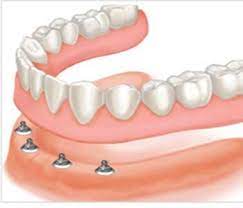Introduction
Dental implants are quickly becoming the standard of care for those missing teeth. Unlike dentures, which can slip and slide, implant-retained dentures anchored to the jawbone provide a much more secure fit.
This can be a game changer for those who have trouble eating or speaking because of loose dentures. Implant retained dentures are also more comfortable than traditional ones that can help patients to have a beautiful smile.
Do you know about this new state-of-the-art denture to get the desired and confident smile? Let’s scroll down to get the details.
What are Implant Retained Dentures?
Dentures have been used to help people with missing teeth for centuries, but in recent years, technology has made a massive leap in dentistry design and function. One of the most exciting advances in denture technology is the implant-retained denture.
An implant-retained denture is a type of denture that is anchored into the jawbone by one or more dental implants. Dental implants are small titanium posts that are surgically placed into the jawbone and allowed to fuse with the bone over time.
Implant-retained dentures offer many benefits over traditional dentures. They are much more secure and don’t slip or move around in your mouth like traditional dentures. This process, called osseointegration, provides a strong and stable foundation for the dental prosthetic.
How Do They Work?
Dentures have been around for centuries, but implant-retained dentures have become increasingly popular in recent years. So, how do they work?
Dentures are anchored to the jawbone by one or more dental implants. The implants are placed in the jawbone and allowed to fuse with the bone over several months. Once the implants are in place, they provide a sturdy foundation for the denture.
Benefits
They can also be used to support dentures. There are many benefits of implant-retained dentures.
Stable
Dental implants are an excellent solution for patients who have lost all of their teeth. Unlike dentures, which can slip and slide, implant-retained dentures are much more stable.
Preserve the bone
Another benefit of implant-retained dentures is that they preserve bone in the jaw. Traditional dentures can cause bone loss in the jaw over time because they do not provide any support or stimulation to the bone.
This can lead to a change in the shape of the face and premature aging. It also prevents facial sagging and wrinkles.
Permanent solution for teeth loss
Implants are titanium posts that are surgically placed in the jawbone to serve as an anchor for artificial teeth. They are a permanent solution to the problem of loose, uncomfortable dentures.
Gives confidence in speaking and eating
If you’re one of the millions who suffer from tooth loss, you may feel like your options are limited. Traditional dentures can be uncomfortable and inconvenient and often don’t stay in place well.
Implant-retained dentures provide the stability that helps for confident eating and speaking. They’re also more comfortable to wear since they don’t rest on your gums like traditional dentures.
Drawbacks
While these dentures offer many benefits, there are also some drawbacks.
- One downside is the cost. Implant-retained dentures can be more expensive than traditional dentures.
- Another potential drawback is the surgery required to place the implants. This surgery can be invasive and may require a lengthy recovery period.
- Additionally, it requires extra care and cleaning, as you must clean both the implants and the dentures themselves.
Is implant-retained denture a good option for everyone?
If you’re considering dentures, you may wonder if you’re a good candidate for them or not. Implant-retained dentures are an option for many who want a more secure fit. Here are a few things to consider if you consider these dentures.
- Do you have enough bone density?
One of the things that implants need is strong bone to support them. If you don’t have enough bone density, implants may not be an option.
- Are your gums healthy?
Your gums need to be healthy to support implants. Getting implants may not be possible if you have periodontal disease or other gum problems.
- Are you willing to commit to oral hygiene?
Implants require a commitment to oral hygiene. So, if you are unwilling to maintain proper oral hygiene, it is not suitable for you.
Conclusion
Dentures have been used for centuries to help people with missing teeth. But they are not without their problems. Many people find that dentures are uncomfortable and can make it difficult to eat and speak. They can also slip out of place, embarrassing the wearer.
Now there is a new option for those who want to improve their quality of life and their smile: implant retained dentures. It is a game changer for many people because they finally have a solution that enables them to enjoy their life without the hassle and embarrassment of traditional dentures.
References
1: Interventions for replacing missing teeth: different types of dental implants
https://doi.org/10.1002/14651858.CD003815.pub4
2: Selection of artificial teeth
https://doi.org/10.1016/0022-3913(67)90185-0









